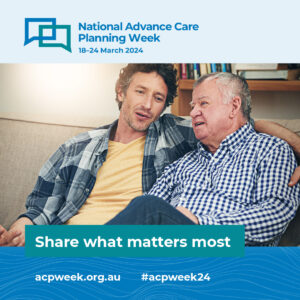We’re celebrating National Advance Care Planning Week (18-24 March), a time dedicated to fostering informed healthcare decision-making and advocating for proactive health planning.
What is Advance Care Planning?
Advance Care Planning (ACP) is a collaborative process aimed at preparing individuals for their future healthcare needs. It is a voluntary and ongoing dialogue that ensures one’s healthcare preferences and values are documented and respected. Through ACP, individuals can articulate their treatment preferences, end-of-life care wishes, and medical directives.
The Benefits of Advance Care Planning
The advantages of engaging in Advance Care Planning are multifaceted:
- Consistent Care Delivery: ACP helps guarantee that individuals receive care that aligns with their wishes and values, even if they are unable to communicate their preferences in the future.
- Enhanced End-of-Life Care: By outlining preferences in advance, individuals can receive more personalised and satisfactory end-of-life care.
- Improved Communication: Advance Care Planning encourages open and honest communication between individuals, their families, and healthcare professionals, fostering mutual understanding and respect.
- Reduced Moral Distress: Families and caregivers experience less moral distress when they are aware of their loved one’s healthcare preferences, making difficult decisions more manageable.
- Prevention of Unwanted Treatments: ACP may help prevent unnecessary or unwanted medical interventions and treatments, ensuring that care remains focused on the individual’s goals and quality of life.
Empowering Individuals Through Information
At Reliant, we recognise the importance of Advance Care Planning in promoting individual autonomy and quality healthcare. We are committed to providing resources, guidance, and support to help individuals and families navigate the ACP process.
For more information on Advance Care Planning and how you can get started, please reach out to our compassionate team of healthcare professionals, and find information and conversation starters on the Advance Care Planning Australia website.
Let’s use National Advance Care Planning Week as an opportunity to prioritise our health and wellbeing, and to take proactive steps towards shaping our healthcare futures.



 This week we were honoured to attend the
This week we were honoured to attend the 